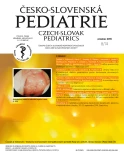Amniotic fluid aspiration in newborn
Authors:
J. Prajka; J. Dort
Authors‘ workplace:
Neonatologické oddělení, Fakultní nemocnice Plzeň
Published in:
Čes-slov Pediat 2019; 74 (8): 465-467.
Category:
Case Report
Overview
The aspiration of amniotic fluid is a common cause of respiratory distress in term newborns. Aspirated amniotic fluid can either be uncontaminated or contaminated by meconium as a result of hypoxia of the newborn during the delivery. The postnatal adaptation is altered. Shortly after the delivery appears tachypnoea and dyspnoe, low oxygen saturation and cyanosis. The amniotic fluid is repeatedly being sucked from the upper aiways. The X-ray scan of teh chest usually shows thickened lung pattern. In the therapy is used preferentially non-invasive ventilatory support, eventually antibiotics nad application of the surfactant.
The case shows a typical serious aspiration of amniotic fluid stained by meconium.
Keywords:
amniotic fluid aspiration – meconium – respiratory distress syndrome – surfactant – soft care
Sources
1. De Cunto A, Paviotti G, Demarini S. Neonatal aspiration: not just meconium. J Neonatal Perinatal Med 2013; 6 : 355–357.
2. Garcia-Prats JA. Clinical features and diagnosis of meconium aspiration syndrome. UpToDate Aug 17, 2017.
3. Garcia-Prats JA. Prevention and management of meconium aspiration syndrome. UpToDate Dec 17, 2018.
4. Pender ChB. Respiratory distress in the newborn due to aspiration of amniotic fluid and its contents. Resuscitation 1973; 2 : 157–167.
5. Dort J, Matas M, Mocková A, a kol. Méně invazivní podání surfaktantu (LISA) nedonošeným novorozencům s velmi nízkou porodní hmotností. Čes-slov Pediat 2018; 73 (Suppl 1): 16.
6. Koos BJ, Rajaee A. (2014) Fetal breathing movements and changes at birth. In: Zhang L, Ducsay C (eds). Advances in Fetal and Neonatal Physiology. Advances in Experimental Medicine and Biology. Vol 814. NY, New York: Springer, 2014.
Labels
Neonatology Paediatrics General practitioner for children and adolescentsArticle was published in
Czech-Slovak Pediatrics

2019 Issue 8
- What Effect Can Be Expected from Limosilactobacillus reuteri in Mucositis and Peri-Implantitis?
- The Importance of Limosilactobacillus reuteri in Administration to Diabetics with Gingivitis
-
All articles in this issue
- Treatment of appendicitis in pediatric patients – Status quo 2017
- Changes in blood pressure and some other parameters in term infants during phototherapy
- Is coarctation of the aorta in pediatrics a risk diagnosis?
- Amniotic fluid aspiration in newborn
- Adenoid vegetation and adenoidectomy in children
- Doporučený postup České pediatrické společnosti a Odborné společnosti praktických dětských lékařů ČLS JEP pro suplementaci dětí a dospívajících vitaminem D
- XXXIV. Celoštátna konferencia Spoločnosti dorastového lekárstva s medzinárodnou účasťou
- Vzpomínka na MUDr. Josefa Havlíka (1931–2019)
- Věcný rejstřík
- Czech-Slovak Pediatrics
- Journal archive
- Current issue
- About the journal
Most read in this issue
- Amniotic fluid aspiration in newborn
- Doporučený postup České pediatrické společnosti a Odborné společnosti praktických dětských lékařů ČLS JEP pro suplementaci dětí a dospívajících vitaminem D
- Adenoid vegetation and adenoidectomy in children
- Treatment of appendicitis in pediatric patients – Status quo 2017
